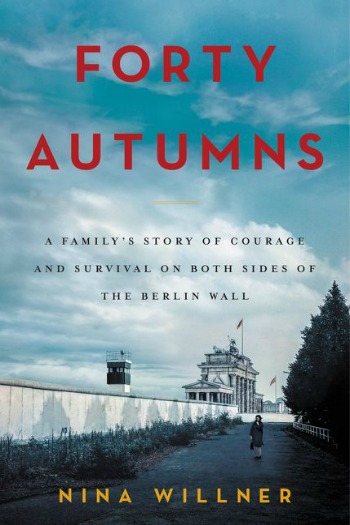This post may include Amazon links. As an Amazon Associate I earn from qualifying purchases.

Forty Autumns by Nina Willner
Narrator: Cassandra Campbell
Publisher: William Morrow (Harper Audio)
Release Date: October 4, 2016
Length: 416 pages (10 hrs. 10 mins.)
Buy on Amazon
{A Bit of Backstory}
Single Sentence Summary
In the wake of WWII, a German family is divided when one daughter flees to the West, as the rest of the family finds themselves absorbed into communist East Germany.
From the Publisher
“In this illuminating and deeply moving memoir, a former American military intelligence officer goes beyond traditional Cold War espionage tales to tell the true story of her family—of five women separated by the Iron Curtain for more than forty years, and their miraculous reunion after the fall of the Berlin Wall”
The Draw
- Desire to learn more about what happened after WWII.
- Came highly recommended by Sarah @sarahsbookshelves
- I’ve spent quite a bit of time in Germany, making it even more interesting to me.
{My Thoughts}
What Worked For Me
A History Lesson – I’ve read many, many WWII novels, yet very little about the post war years, and certainly nothing about those years in East Germany. The lives of Nina Willner’s family documented life in East Germany, first under Soviet rule and later under even harsher rule by the country’s own communist leaders. Like most East Germans, Willner’s grandparents, aunts and uncles always had to guard their words and actions lest the secret police become aroused. Her grandfather spent three years in an asylum because he dared to question how farmers were being treated. After ordering a car, it took her uncle 12 years to actually get one. Food and jobs were in short supply and the quality of goods was poor. Citizens were fed a constant diet of propaganda against the West. For years many knew no better as the East was blocked almost completely from access to news beyond their borders.
Both Sides of the Wall – Willner juxtaposed the life of her mother, Hanna (who escaped to the West), with that of her siblings left in the East. It was fascinating to hear how different the lives of the siblings became. Hanna living in the U.S. had a life of ease and access to most anything she wanted, except her family. Those left behind, relished their family ties, but lived a life where they were constantly on guard and often wanting.
Reunification – While I vividly remember the fall of the Berlin Wall and the reunification of Germany, I’d thought little about the reuniting of German families. I teared up many times at the end of Forty Autumns as Hanna, her brothers and sisters, and their children finally saw each other after forty years apart.
{The Final Assessment}
Nina Willner did a beautiful job of telling much more than just her family’s story. Forty Autumns was really the story of a nation held captive long after the end of WWII. Her family was the catalyst, but their story (in slightly different forms) undoubtedly mirrors that of tens of thousand East German citizens. I know I’m grateful to Willner for shedding light on their suffering and even more so on their spirit and fortitude. Grade: A
Narration: Overall, I thought Cassandra Campbell did a good job narrating Forty Autumns. Her reading was clear and always easy to understand, yet just a little “NPR-ish” for my taste. Grade: B
If you liked this book you might also enjoy:
- 22 Britannia Road by Amanda Hodgkinson – A great novel about a Polish couple reunited in England after WWII.
Disclosure: There are Amazon Associate links included within this post.

I’m so glad you loved this one, despite some just OK narration. You know how I’m kind of burned out of WWII? Well, I’m not burned out of the post-WWII Communist rule era! I’m still totally fascinated by that. And, you’re right, when all this was happening, I never really thought about what it was like for a family to live in East Germany or be separated from family by the Wall. I loved Willner’s portrait of daily life under East German rule – so many eye-opening details that I’d never really considered.
I WILL read this in 2018! Im looking forward to reading it. I actually got the book in the mail from my non fiction November swap partner(along with other goodies) which makes it extra special. From your description I already know which friend I will pass the book along to when I finish!
While I read a lot of WWII novels, this is a time period I don’t normally read about, particularly this area. This sounds like a really special book, and I think the reunification scenes would make me cry, too. It’s heartbreaking to learn about what these families went through.
Perhaps I’m burned out on WWII after “We Were the Lucky Ones” (which resembles this in voice), “The Nightingale,” “All the Light We Cannot See” and “Winter of the World” but I found this just a bit better than average. I’d say the middle third of the book was the best in terms of describing the totalitarianism of East German society.
If you liked this, check out “A Woman in Berlin” which covers a few short months at the end of WWII as the Soviets take over east Berlin. Excellent yet horrifying.
Thanks for the book recommendation, Madeline. A Woman in Berlin sounds fascinating.